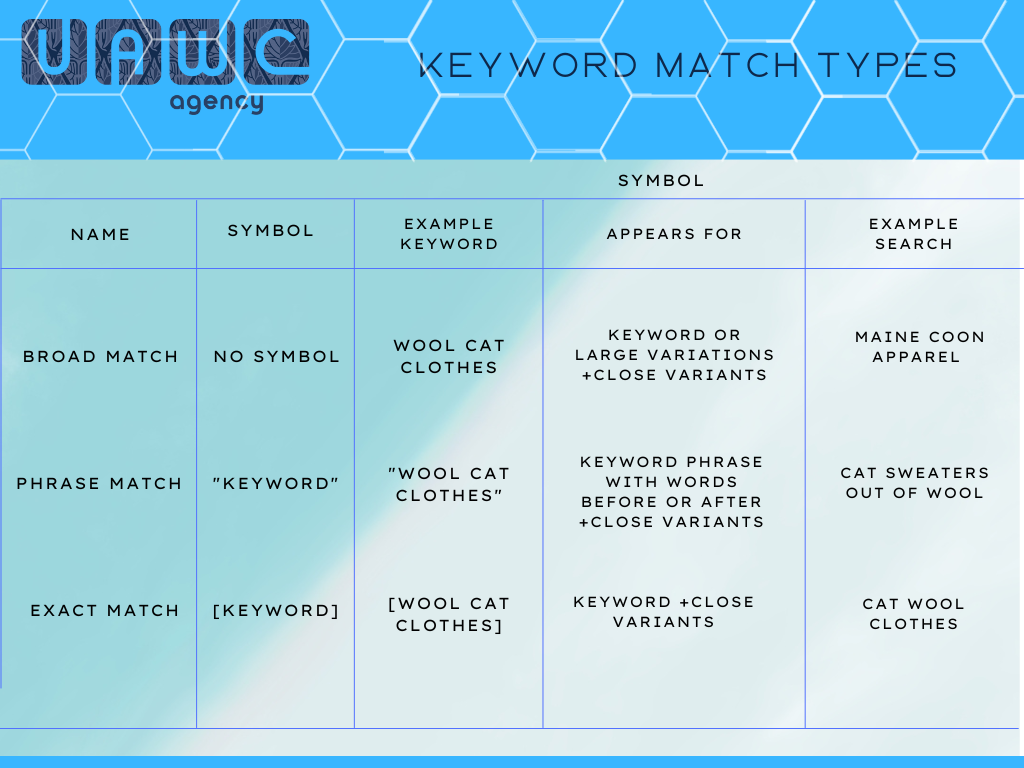Google Ads keyword match types: a detailed overview
Posted on 2023-11-09
Introduction
You have the best keyword and negative keyword lists in this part of the Orion Spur and, probably, beyond, but is that enough to make your marketing truly shine among the stars? Stay with us to learn more about keyword matching types and discover how to use them to improve your targeting.

Irrelevant traffic that brings no conversions is the bane of any marketer’s existence. We’ve already covered one way of dealing with it in our article on negative keyword lists. However, good use of negative keywords is not the only way of making sure that your ads are delivered to the relevant audience. You also have to make sure your normal keywords are working the way they should.
The first step to achieving that is understanding the way different match types interact with your ads and learning how and when to use each one of them. In this article, we’ll tell you everything you need to know and help you take the next step toward making your targeting precise and relevant.
What are Google Ads keyword match types?
As of the moment of writing this article, Google Ads‘ algorithm is not yet capable of reading its users’ thoughts and intentions. To make it do what we expect from it, we have to use different settings and tools provided by the platform, which includes choosing the match types for our keywords.
Keyword match types are pre-determined settings that tell Google’s algorithm how exactly you want it to target the keywords you give it. Do you want it to add synonyms to its radar or do you only want to target the exact words you’ve specified? Different keyword match types give you control over it, allowing you to make your targeting as broad or as narrow as you want it to be.
Why use different keyword match types?
One way to describe digital marketing is searching for a way to achieve a specified goal using the resources and tools available. This search often involves a cycle of trial and error – probing for the most promising approach, then concentrating one’s efforts on it. Match types can be yet another instrument of this research, as well as a way to fine-tune your marketing campaigns’ targeting to suit your goals.
Smart use of keyword match types can help you with optimizing budget and increasing conversions by delivering your ads to a relevant audience. However, it is worth noting that, just like any other tool or setting regarding keywords, match types can just as easily cut off relevant traffic when misused. In the next section, we will tell you how each of the keyword match types works and give you examples of how to best utilize them in your campaigns.
Keyword match types overview
At the moment of writing this article, Google Ads has 3 keyword match type settings you can use. Although some of them might not be practical to use, we will tell you about each one to make sure you get a full picture.

Broad match keywords
To use this match type, input your keyword without any extra symbols, as shown in the image above. For this match type, word order is irrelevant. Google will treat “wool cat clothes” and “cat wool clothes” exactly the same. Using duplicates, however, is not detrimental to your budget or results. When bidding, Google will use whichever ad duplicate has the highest Quality Score.
When using this match type, Google will be targeting queries that can be somewhat loosely related to your keyword. In fact, those search terms might not even include any of the keywords themselves, but only their synonyms or words Google thinks are related to your ad. The content of your landing page, other keywords in an ad group, and a user’s recent search history also contribute to determining whether your ad is relevant or not.
Obviously, putting too much trust in Google’s algorithm can become a problem, especially if you are using single-noun keywords. Therefore, it is best to use this match type only with long-tail keywords that have enough words in them to give Google an idea of what exactly you are targeting.
The main advantage of this match type is that it allows you to spend less time on keyword research. However, using it will likely make you pay for quite a few irrelevant clicks, especially if your negative keyword game is lacking.
Note: You might find some other sources mentioning modified broad match keywords. The reason we didn’t list them here isn’t that we are lazy or unknowledgeable, but because they’ve been removed in July 2021.
Phrase match keyword
To use this keyword match type, put quotation marks “” around your keyword.
The middle ground between Broad match’s wide reach and the precision of Exact match, Phrase match keywords will make your ads show for queries that include your keywords’ meaning or imply it. It can also target a more specific form of its meaning even if it doesn’t precisely match the keyword that carries it. It will also target queries misspelling a keyword, which can be especially useful if your target audience includes children, people not using their native language, or less educated classes of society.
Note: Some sources might claim that this match type makes your ads target the queries containing exact keywords in the exact order they come in. Unless you have a time machine that goes back to before 2021, this information is false.
Phrase match is by far the safest match type to be using in your campaigns. It won’t cut you off from potential customers like Exact match would, and it won’t make you waste as much money on irrelevant search queries as Broad match. Combine it with a well-developed negative keyword list, and you will have solid and rather easy-to-set-up targeting.
Exact match keywords
To use this match type, put square brackets [] around your keyword.
This one is a precision tool. Ads using Exact match type will only target queries with the exact same meaning or intent as your keyword. They will not show for synonyms, but minor misspellings, plural/singular forms of nouns, and acronyms will be included in an ad’s targeting.
The main advantage of this keyword match type is the extent of control it gives you over your targeting. To reach a comparable relevancy level using Phrase match, you’d have to spend hours on keyword research for putting together an extensive negative keyword list. With Exact match, you just need to put your keyword in square brackets, and Google does the rest for you.
Note: Phrase match type includes all the queries of the Exact match type, and Broad match includes all the queries of the three keyword match types. Therefore, if you are going for a broad reach on a certain keyword, using all three match types for it would be redundant and unnecessary.
Negative keyword match types
While we have briefly touched on this subject in our article on negative keywords, it is important to elaborate on it here as well for extra clarity. In general, negative match types are very similar to their positive counterparts, however, their effect is directly reversed. It is extremely important to know what you are doing when working with negatives: while misuse of positive keyword types can bring in irrelevant traffic or make you miss some promising search queries, badly implementing negatives can actively keep relevant and lucrative customers from your landing page.
Negative broad match keywords
The most restrictive option and the default match type, it can be either a great way to improve your targeting or shoot yourself in the foot. While using it, your ad will not show for queries containing all of the selected keyword terms in any order. For example, if the negative keyword using this match type is “wool cat clothes” your ad will not show for queries like “how to make cat clothes out of wool”, “clothes out of cat wool”, “how to remove cat hair from wool clothes”.
Negative phrase match keywords
A slightly less restrictive option that prevents your ads from showing if the search query contains all of the keyword terms in the exact order you specify. Continuing our feline apparel example above, your ad will not show for queries like “buy wool cat clothes in Amsterdam” and “best wool type for cat clothes”, but queries with different keyword terms order, like “cat clothes out of wool” will still be targeted.
Negative exact match keywords
The most precise option out of the three, this match type will only prevent an ad from being shown if the search query is the keyword. In other words, anything but “wool cat clothes” can and will be targeted. While this match type might look a little useless on paper, it can, depending on the kind of products or services you offer, save you from a lot of irrelevant queries. For example, you probably wouldn’t want to waste your confectionary’s ad budget on Tool fans searching for “chocolate chip trip”.
Best keyword match types strategies

Now that we know the instruments at our disposal, it is time to figure out the best way to use them to bring relevant traffic to your website. It is also important to remember that there is more to ad targeting than just keywords and their match types. Negative keywords and their own match types are just as important for ensuring relevancy as their positive counterparts, if not even more so.
Using broad match keywords
If you’ve just started your Google Ads account and are operating on a tight budget, it might be better to forget these exist at all. The wide reach of a broad match keyword can and will waste your budget on irrelevant clicks. While it can be mitigated with smart use of negatives, particularly negative broad match keywords, doing so would require more work than simply using a different, more precise match type.
The most common use of broad match keywords is for research purposes. By analyzing search terms reports of ads using this match type, you can discover new prospective keywords you might want to target with more precise match types and simultaneously find irrelevant queries that would fit right into your negative keyword list.
Alternatively, this match type can be useful if your goal is not a direct increase in conversions but improving your brand awareness, or increasing website traffic.
Using phrase match keywords
If you don’t know which type to use, this is the safest bet. Its targeting is neither too wide nor too narrow, giving you a nice balance between reach and relevancy. Add some negative phrase match keywords to get rid of related, but irrelevant queries, and you’ll have a solid foundation to build your Google Ads campaign upon.
This is the most popular match type among most advertisers, and for good reason. In the vast majority of cases, it provides a high search volume with little compromise in relevancy. However, its reach is still wide enough that it can target irrelevant queries, so a good list of negative keywords is still required for the best results, although to a lesser extent than with broad match type keywords.
Using exact match keywords
If you are on a tight budget and do not yet have enough data and statistics, this keyword match type can be a great option. You’ll be getting fewer clicks and impressions, but their relevancy will be all but guaranteed, increasing the chance for conversions.
Another advantage of this match type is its low reliance on negatives. An exact match keyword will only target queries carrying its exact meaning, significantly reducing the chances of an irrelevant query slipping in. Therefore, this match type can be a good option to put your money on until you are confident in your negative keyword list.
Summary
Keyword match types are an integral aspect of any Google Ads campaign. Understanding how they work and identifying the right circumstances for applying each of them can turn your marketing from average to amazing in no time.
We hope that this article was helpful in expanding your knowledge of Google Ads’ extensive toolset and wish you and your business a happy and prosperous future. If you want to increase your chances of seeing it, you might want to try out our services.






